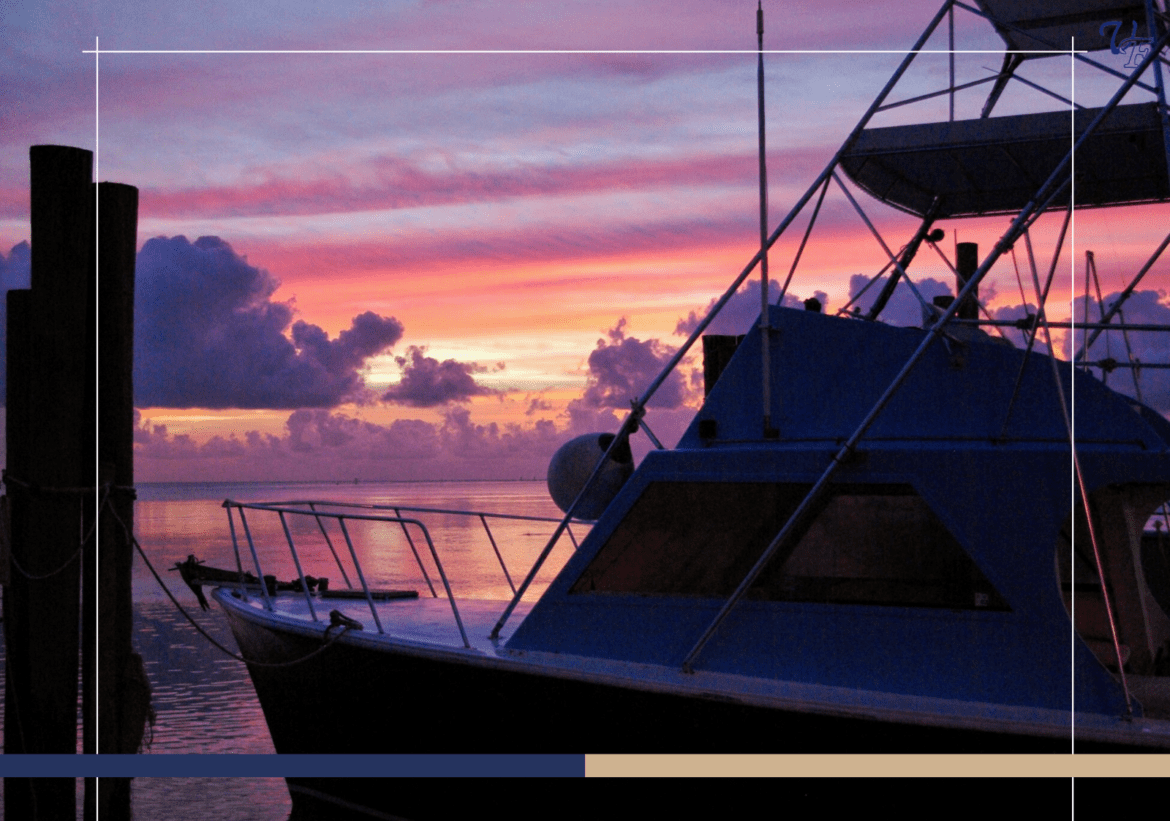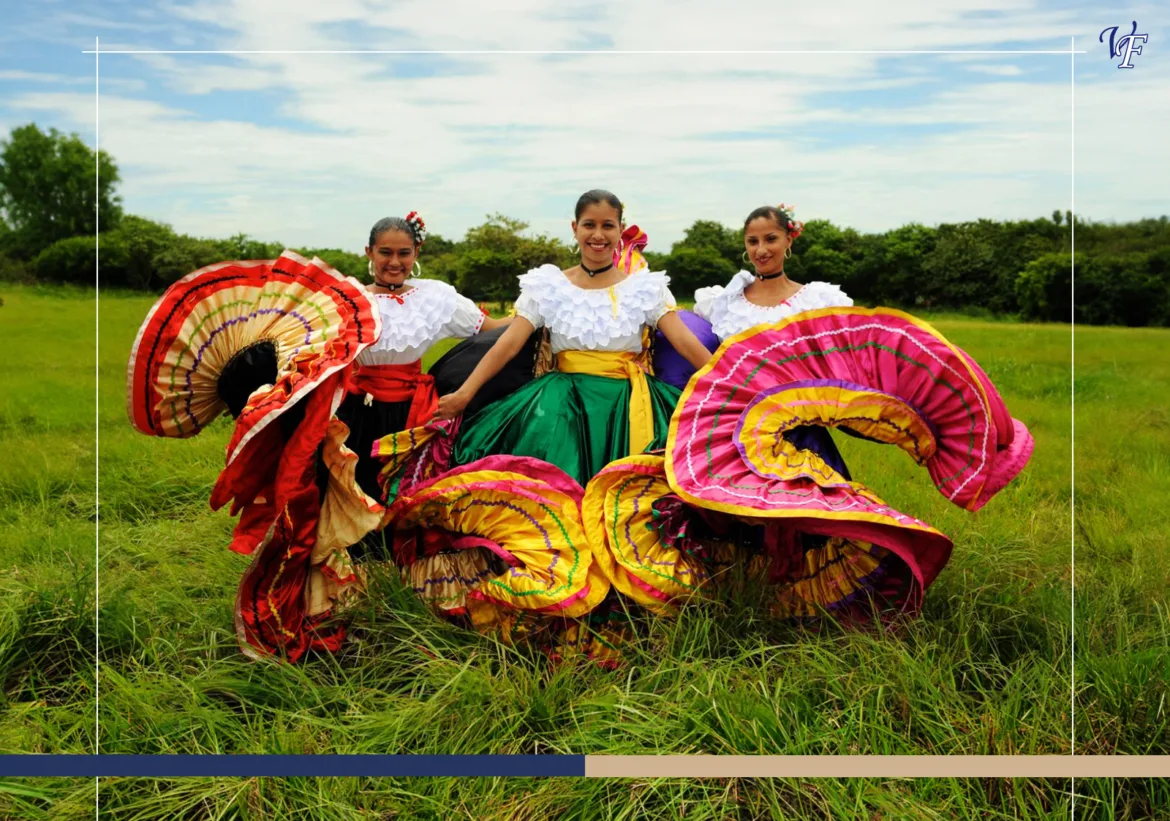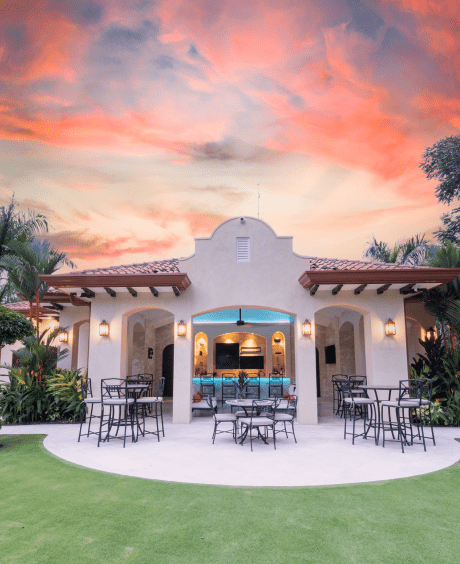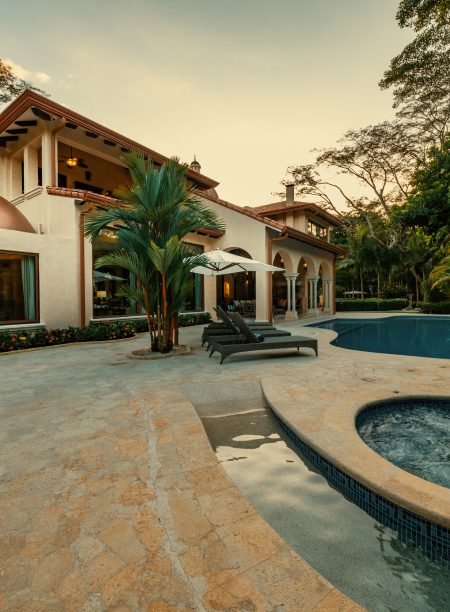Costa Rica is a popular destination for planning fishing trips due to its diverse landscape and access to the Pacific, Atlantic, and Caribbean oceans. The unique experience of fishing off the volcanic coasts of Costa Rica is unforgettable and may feel surreal.
For all avid anglers looking for a new adventure, a fishing excursion in Costa Rica should be at the top of their list. Costa Rica offers the best sportfishing in the world with its rich marine life and beautiful coastline.
But before booking a fishing trip, it is important to know a few essential fishing regulations and practices in Costa Rica to have the best experience. This blog covers the importance of fishing licenses and permits, using appropriate equipment, and following responsible fishing and the FPR (Fish, Photograph, Release) philosophy.
Why Does Costa Rica Regulate Fishing?
Fishing regulations are essential in Costa Rica to ensure a sustainable fishing industry. Regulations ensure the sustainability of the fish population and the overall health of the marine ecosystem. Overfishing can lead to the depletion in the number of fish and negatively impact the health of the ecosystem. By setting limits on the number of fish that can be caught and implementing practices to prevent overfishing, fishing regulations in Costa Rica help ensure that the fish population recovers over time and remains healthy.
Many fishing practices, such as bottom trawling and longlining, can negatively impact marine habitats and lead to the accidental capture of non-target species. Implementing fishing regulations can minimize these negative impacts by setting limits on the types of gears for fishing that anglers can use and establishing protected areas where certain fishing practices are prohibited.
Types of Fishing Allowed in Costa Rica
In Costa Rica, the authorized types of fishing vary from region to region in the country. Costa Rica follows several practices to promote the long-term viability of the fishing industry and safeguard its marine resources. These practices include capping the number of fish, restricting inappropriate gears for fishing, and establishing protected areas where certain fishing practices are prohibited.
The type of fishing can be bucketed into three major types.
- Artisanal fishing: This type of fishing is small-scale, carried out by using traditional methods such as handlines, nets, and traps. Artisanal fishing is a vital source of livelihood for local communities in Costa Rica.
- Commercial fishing: Commercial fishing refers to catching fish and other seafood for sale or trade rather than for personal consumption. It’s done with the use of various methods, such as fishing boats, nets, lines, or traps, to catch fish from oceans, rivers, or other water bodies.
- Sportfishing/Recreational fishing: Sportfishing, also known as game fishing, is carried out for leisure or recreation. It typically involves using specialized equipment and techniques to target large, predatory fish species.
It is important to note that the specific regulations governing fishing in Costa Rica can vary depending on the location and the type of fishing.
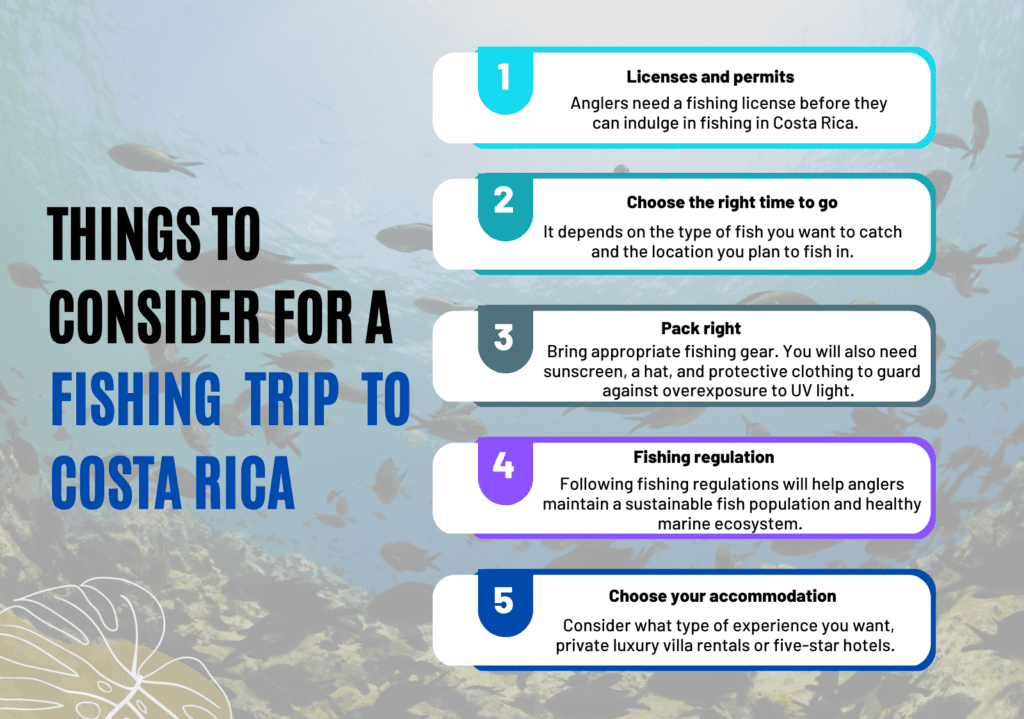
Fishing Licenses and Permits in Costa Rica
In Costa Rica, getting a license is mandatory even for recreational fishing.
- Licenses and permits: Those who wish to engage in commercial fishing or sport fishing in Costa Rica need a license or permit. In addition, anglers need to have a fishing license to verify that they use fishing gear sustainably and responsibly. You can buy a fishing license from the offices of INCOPESCA (Costa Rica Institute of Fisheries and Agriculture) and local government agencies across Costa Rica. The fishing license costs $15 per week, $30 monthly, and $50 per year.
- Obtaining a fishing license: In Costa Rica, anglers must complete an application and provide documents such as proof of identification and address to get a license.
- Costs and expiration: The cost of fishing licenses and their expiry dates vary depending on the license type and the duration.
Fishing Responsibly
“Responsible fishing” in Costa Rica means following specific rules to keep fish populations and aquatic habitats healthy. Vital elements of a responsible fishing approach followed in the country include:
- Adhering to regulations: Several rules are enforced in the country. By adhering to these regulations, anglers can help Costa Rica maintain a healthy aquatic habitat for sustainable fishing.
- Using sustainable practices: Anglers need to adopt sustainable fishing practices to minimize the negative impact of fishing on aquatic habitats. These practices include using less damaging gears for fishing for marine life, practicing a catch-and-release approach, and avoiding the accidental capture of non-target species.
- Protecting marine habitats: Fishing enthusiasts should also protect marine habitats, such as coral reefs, seagrass beds, and mangroves, as these habitats provide necessary feeding and breeding grounds for many fish species.
Overall, a responsible fishing approach involves a holistic, conservation-oriented approach to fishing and ensures the sustainability of fish populations and the marine ecosystem for future generations.
FPR (Fish-Photograph-Release)
Anglers in Costa Rica and other countries often follow the practice of Fish-Photograph-Release (FPR) to conserve fish populations and promote sustainable fishing practices. This practice involves releasing fish back into the water after taking photographs to prove your catch.
The idea behind FPR is that by releasing the fish back into the water, they can continue to reproduce and hence, contribute to maintaining the overall health of the ecosystem. In the FPR approach, anglers typically follow a set of guidelines designed to ensure the safe release of the fish. These guidelines include recommendations on handling the fish, carefully removing the hook, and releasing the fish back into the water.
FPR is a critical conservation practice that can help promote sustainable fishing practices and ensure the long-term health of fish populations in Costa Rica and other countries. By releasing fish back into the water, anglers can enjoy the sport of fishing, helping protect and conserve fish populations for future generations.
Release Fish Quickly and Correctly
Releasing fish quickly and correctly is a crucial practice that Costa Rica and other countries follow for sustainable and responsible fishing. This practice involves safely releasing the fish into the water and minimizing the stress on the fish, which can help improve the chances of their survival after their release.
- Wet hands make the task easy: Before handling the fish, anglers should wet their hands to reduce the amount of slime lost from the skin of the fish. Wet hands will help improve the chances of their survival after they are released.
- Remove the hook carefully: If the fish is hooked, it is crucial to remove the hook as carefully as possible to minimize damage to the fish.
- Hold the fish gently: When handling the fish, hold it gently to avoid causing any unnecessary stress or damage to the fish.
- Release the fish as quickly as possible: Once the hook is removed, release the fish back into the water as soon as possible. It will help reduce the time fish spend out of the water, which can improve their chances of survival.
By following these guidelines and releasing fish quickly and correctly, anglers can help promote sustainable fishing practices and make the experience better for everyone.
Conclusion
Fishing is a popular activity in Costa Rica, attracting visitors worldwide to its abundant marine resources. For those seeking both luxury and adventure, Villa Firenze, one of the luxury villas in Costa Rica, offers a unique blend of both. Located on the Pacific Coast, known for some of the best sportfishing opportunities in Costa Rica, Villa Firenze provides its guests with an all-inclusive fishing charter fully equipped with all the necessary fishing gear. One cannot afford to miss this opportunity when visiting this tropical paradise.
However, it is essential to remember that these marine resources are not limitless and must be protected for the benefit of the current and future generations. By following these regulations, anglers can ensure that their activities are sustainable and do not harm the marine environment or local communities in Costa Rica.


